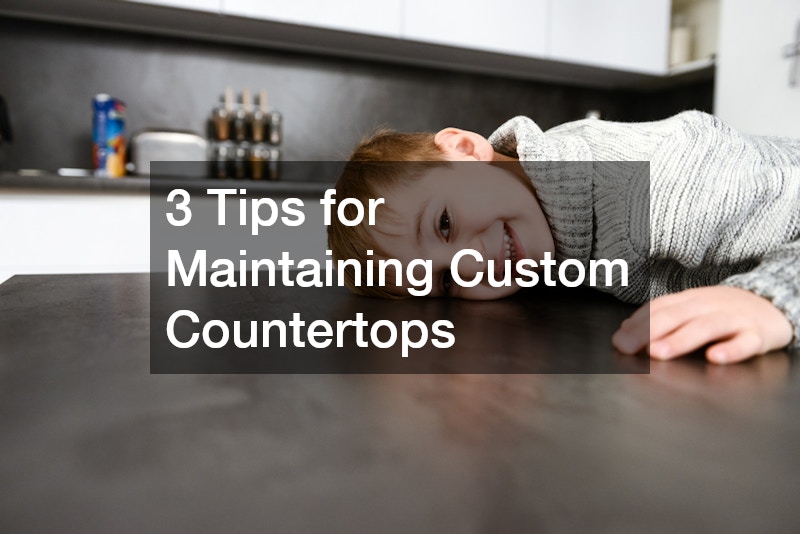Custom countertops can add a unique touch to your home, but maintaining them requires some specific techniques. In this article, we will explore three essential tips for preserving the beauty and functionality of your custom countertops. By addressing some common questions and concerns, we aim to provide comprehensive guidance for countertop care.
How Do I Prevent Scratches and Stains on My Countertops?
Choose the Right Cleaning Products
Many cleaning products can be too harsh for custom countertops. Opt for gentle, non-abrasive cleaners that are suitable for your countertop material to avoid scratches. Always read the product labels carefully to ensure compatibility with your countertop material, as using inappropriate cleaners could lead to permanent damage.
While choosing cleaning products, it’s important to consider the specific requirements of your countertop material. For instance, stone surfaces might need pH-balanced cleaners. Regular experimentation with cleaning products without proper knowledge can degrade the quality of your countertops over time, so expert advice can be beneficial.
Enzymatic cleaners can sometimes offer a more natural alternative, reducing the likelihood of chemical residues affecting the countertop surface. Remember that sustainable cleaning options not only protect your countertops but also keep your household environment safe from harsh chemicals. Sustainable practices in cleaning align with modern trends toward eco-friendliness in home care.
Use Protective Mats and Cutting Boards
Utilize mats and cutting boards to protect your countertops from scratches caused by sharp objects and stains from food spills. Cutting directly on your countertops not only risks damage but can also dull your knives. Furthermore, placing hot pots or pans directly on the surface can result in heat marks or discoloration, which can be difficult to repair.
Protective mats and trivets not only save your countertops from scratches but also provide an additional layer of defense against thermal damage. This habit may seem trivial, but it can substantially add to the lifespan of your synthetic or natural stone countertops. The use of non-slip cutting boards can further mitigate accidents in the kitchen, offering both protection and functionality.
It’s beneficial to train your entire household in utilizing these protective items as a standard practice. Coordination with your family can ensure that everyone understands the importance of maintaining the integrity of your countertops. A small investment in mats and boards results in long-term savings on countertop repairs and maintenance.
Quickly Address Spills
Clean spills immediately to prevent stains from setting. Different materials have unique susceptibilities, so it’s important to know your countertop’s weaknesses. Immediate attention to spills can significantly reduce the chances of permanent damage, as prolonged exposure can cause even sealed surfaces to absorb liquids over time.
Educate yourself and your family on which substances can pose the greatest threat to your specific countertops. For example, acidic substances like wine or citrus juices can etch into marble surfaces, leaving irreparable marks. Proactive measures including keeping cleaning cloths at hand can aid in quickly addressing unexpected spills.
Establishing a routine for daily or weekly inspection of your countertops can help identify hidden issues caused by spills. It is also crucial to differentiate between substances that may simply need water to clean versus those that require special cleaners. Immediate prevention practices are essential to ensuring the long-term aesthetic and functional quality of your countertops.
What Are the Best Cleaning Routines for Different Countertop Materials?
Granite and Marble Countertops
Regularly clean granite and marble countertops with a mild dish soap and warm water. Avoid acidic or abrasive cleaners that can damage the stone. Consistent cleaning helps maintain the natural gloss and prevent dulling over time.
It is important to dry the surface immediately after cleaning to prevent water spots. Adding a sealant to your cleaning routine can offer additional protection against stains. While granite is generally more resilient, marble can be more susceptible to stains, so applying an additional layer of protection can be advantageous.
Weekly maintenance checks can help detect surface scratches or dullness early. For stubborn stains, use a paste made from baking soda and water, applying it gently with a soft cloth. Knowing your material can help you avoid potential pitfalls that come with improper cleaning methods.
Wood Countertops
Clean wood countertops with warm, soapy water and dry them thoroughly. Periodically apply mineral oil to maintain the wood’s natural moisture. This practice prevents cracking and warping commonly associated with dry wood surfaces.
Wood countertops are particularly sensitive to water absorption, so it’s crucial to immediately wipe any spills. A regular application of a protective sealant or oil conditions the wood, enhancing its resistance to unforeseen damages. Constant exposure to water or harsh cleaners can lead to irreversible damage, requiring costly repairs.
Incorporate gentle scrubbing techniques with a soft-bristle brush for any stubborn residue on wood surfaces. Overly harsh cleaning tools can create scratches that trap dirt and bacteria, impacting the countertop’s appearance and hygiene. Additionally, maintaining a controlled environment with balanced humidity helps minimize the natural expansion and contraction of wood over time.
Quartz and Laminate Countertops
For quartz and laminate, use a soft cloth with a gentle detergent. Avoid using bleach or strong chemicals that could fade or damage the surface. Ensuring that the cleaning agents are compatible with these materials is vital as they can react differently when exposed to harsh ingredients.
Daily cleaning with a microfiber cloth can effectively remove dust and prevent dullness on quartz and laminate countertops. For laminate surfaces, occasional use of a dedicated polish can maintain its shine. Quartz, known for its durability, still requires assurance against potential etching from exposure to high-pH substances.
Proper maintenance of custom countertops involves careful cleaning, routine inspections, and protective measures. By following these tips, you can ensure your countertops remain an attractive and functional part of your home for many years. A little effort goes a long way in preserving the investment in your custom countertops.
.

